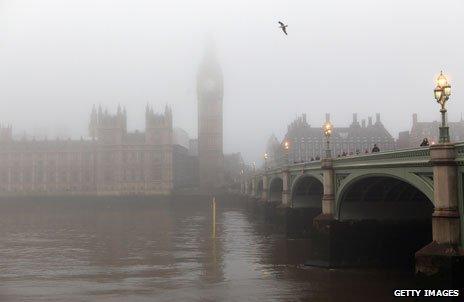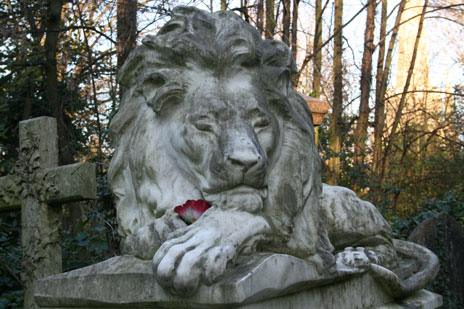A Point Of View: The doors of perception
- Published

In Arthur Machen's supernatural stories, the everyday city landscape of London is portrayed as an illusion, hiding a mystical world. The writer John Gray considers what they teach us about the limits of perception.
There's probably nothing more firmly fixed in our minds at present than the idea that the meaning of life is found in changing the world.
Some of us attach ourselves to large political projects, others to small-scale efforts to improve things. We may aim to alleviate world poverty, or simply to make ourselves rich. Our focus may be individual or collective, local or global. Whatever our practical goals, we're convinced that it's only by changing things around us that we can find fulfilment. Unless we succeed in somehow altering the world, we may be tempted to feel we've failed as human beings.
This belief in the supreme importance of being active is so embedded that we can hardly imagine any other way of living. Yet there have always been some who've understood that achieving something in the world isn't the only way in which human beings can find meaning in their lives. In the past the idea that action isn't the whole of life has been promoted by the great religions, with their traditions of meditation and prayer.
In more recent times, people have looked for alternative ways of living in less familiar traditions. One such person was the writer of fantasy and horror fiction Arthur Machen, who never accepted that action was the sole meaning of human life, or always life's most important part.
Machen's own life was shaped not by any desire for fame or success but by a continuing struggle to make ends meet. Wanting always to write of the elusive vision that was closest to his heart, he enjoyed brief periods of fame followed by long spells of obscurity and poverty.
Born in 1863 as the son of an impecunious Welsh clergyman, he tried to make a living as a writer on the fringes of the decadent movement that flourished in London at the end of the century. He achieved celebrity as the author of stories that mixed the paranormal with paganism and intimations of sexuality.
In 1914 he published a short story, The Bowmen, in which he imagined British soldiers being assisted in the battle of Mons by phantom archers from the battle of Agincourt in the early 15th Century. Machen described the story as a "light fiction", but it led to an outbreak of rumoured visions of the bowmen and while he repeatedly dismissed such reports he was linked, until he died in 1947, with ideas of the supernatural.
It's true that many of Machen's stories are about unwise explorations of a world beyond the one that's revealed to the senses. But like Walter de La Mare, it wasn't so much the supernatural as the mysterious qualities inherent in what we think of as our everyday environment that fascinated Machen. He had a life-long interest in esoteric traditions, for a time joining an occultist society along with the poet WB Yeats, and in later life was increasingly drawn to a mystical version of Christianity.

His view of life is perhaps best presented in one of his most memorable short fictions, published in 1936 when he was 73, which for reasons that aren't altogether clear he entitled simply "N".
It's typical of Machen that he should have set a tale of magical transformation in the seemingly prosaic location of the London suburb of Stoke Newington. "He who adventures in London", he wrote, "has a foretaste of infinity". Machen viewed London as unknowable, and believed that if you walked around the city without any premeditated plan or direction you might stumble on regions that haven't been seen before or would be since.
There are echoes in his writings of Thomas de Quincy, who during his opium-fuelled wanderings claimed to have walked through streets that weren't on any map, and of Edgar Allan Poe, who is mentioned in the story and in fact went to school in Stoke Newington.
The magical transmutation of which Machen writes, occurs as a story within the story. An idle scholar by chance finds a book, A London Walk: Meditations in the Streets of the Metropolis, supposedly published in 1853 by the Reverend Thomas Hampole. In the book the Reverend writes of becoming acquainted in Stoke Newington with a reclusive devotee of mystical philosophy, who believes that "what we now regard as stubborn matter was, primally, the heavenly Chaos, a soft and ductile substance, which could be moulded by the imagination of uncorrupted man into whatever forms he chose it to assume".
These ideas, the Reverend Hampole writes, strike him as "of an extremely fantastic, I would even say fabulous, nature". He is inclined to attach no credence to them, and when the mystic asked him to look out of the window of his flat in the suburb, Hampole at first sees "exactly what I had expected to see: a row or terrace of neatly designed residences". But when he is told to look again, he finds - to his surprise, delight and then terror - an entirely different scene:
"In place of the familiar structures, there was disclosed a panorama of unearthly, of astounding beauty." Instead of the suburban vistas, there are deep dells, overhanging trees, shaded walks, radiant flowers and glowing colours. Gasping for breath, Hampole rushes out into the street, only to find it has resumed its usual aspect, with the trees leafless and black in the dull March daylight.
Machen's story ends inconclusively. When the scholar who finds Hampole's book visits the suburb, he finds nothing that resembles the beautiful garden. We're left unsure whether any such place ever existed. The garden could have been - and according to all normal standards of evidence and reasoning, must have been - a hallucination or else sheer invention.
Machen's fictions aren't intended to persuade the reader that events of the kind he describes could actually happen. He thought of the world as a kind of text in invisible writing, a cipher pointing to another order of things - but you needn't accept anything of this occult philosophy to find his stories more than just entertaining. What they deal with is the nature of human perception.
William Blake wrote that "if the doors of perception were cleansed then everything would appear to man as it is, Infinite. For man has closed himself up, till he sees all things through narrow chinks of his cavern". When he wrote of London giving a foretaste of infinity, Machen expressed the same thought.
Machen became one of the founders of psycho geography - the practice of exploring the human environment, especially in cities, without any definite purpose or preconception of what you may find. When he writes of wandering about London and coming on streets he could never find again, he's usually interpreted as hinting at occult experiences of the kind described in his tale of the mysteriously vanishing garden. But he may mean something different, and perhaps more valuable.

Abney Park cemetery, in Stoke Newington, London
Our exclusive concern with purposeful action crowds out a vital part of human fulfilment. Some of the most valuable human experiences, observes Machen, come about when we simply look around us without any intention of acting on what we see. When we set aside our practical goals - if only for a moment - we may discover a wealth of meaning in our lives, which is independent of our success or failure in achieving our goals. Matter may not be soft and ductile as Machen's reclusive mystic believes, but our lives are changed when we no longer view the world through the narrow prism of our purposes.
Introducing a collection of his stories, Machen writes of "the unsealed eyes" through which he views regions of London that haven't been seen before. What we see through eyes sealed by habit and convention is only an infinitesimal fragment of what actually exists. Struggling to change things around us, we forget that another kind of change is possible - an inner change, through which we can enter a richer and more spacious world that was there all along.
The unknown vistas of which Machen writes aren't revelations of another dimension - an invisible order of things hidden behind appearances - but glimpses of the larger world that passes us by unnoticed every day.
You can follow the Magazine on Twitter, external and on Facebook, external